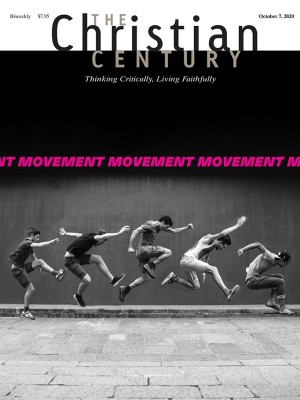Following the disastrous episode with the golden calf, when our ancestors in the faith let their anxiety over Moses’ delay on Mount Sinai get the best of them, Moses and the Israelites teeter on the edge of promise—that liminal space between wilderness and home, between despair and hope—with the sands of Sinai shifting beneath their feet. Because of their disobedience, God has determined not to continue among them when they resume their journey to Canaan.
It has been a devastating turn of events, not at all what Moses expected.
But Moses has never been one to keep his mouth shut in his encounters with the great I AM. Even in the midst of his own uncertainty, Moses speaks his mind to God. He would be the sort of employee who causes the HR department to cringe whenever they see him coming—even if his complaints are reasonable—as he tries to shift work to others or asks for better benefits.
Read our latest issue or browse back issues.
In their first encounter, at the burning bush, Moses hid his face from God, afraid to look. But he soon opened up and admitted his inadequacy for God’s call to him, wondering aloud whether he would know the right answers, worrying that nobody would believe him about his encounter with God, and admitting his lack of skill at public speaking. Even after God’s assurance to resolve each concern, Moses blurted his most fervent plea: Just send somebody else!
God and Moses have come a long way together since then, talking together for days and weeks at a time. Their encounters involve close proximity and mutual sharing, as they build a less guarded and more honest relationship. Face-to-face conversations are the stuff of intimacy, encouraging Moses to open his heart to God and for God to reveal more of Godself to Moses.
Close, intimate communion is inherently perilous, however. The more we learn about others, the greater our knowledge of their potential vulnerabilities—and their knowledge of ours. The closer we get, the more likely we are to hurt one another—one reason that civil wars are anything but civil and family feuds can persist for generations. The practice of wearing masks during a global pandemic is a concrete sign of this more generalized truth. If we aren’t careful, people get hurt.
Moses is not a fan of God’s earlier refusal to journey with the Israelites, and he presses the Lord for a different outcome. He appeals to the special relationship they share, beginning from God’s original command to “bring up this people.” Besides, he adds, God knows him by name and is favorably disposed to him—that should make a difference, right?
More than once Moses expands the circle of concern beyond himself to include the wider community. “Consider, too, that this is your people,” Moses stresses, as if reminding the Lord that their predicament after the golden calf debacle ought to be no surprise. God knew who they were when God chose them. Despite their fear and grumbling and their inability to trust God through times of uncertainty, the people belong to God by God’s own choice. God knows them and has called them, in spite of their flaws. But if they are separated from God’s presence, Moses argues, they might as well stay in the wilderness, bound by their captivity to idols of their own making.
Even after extracting the Lord’s promise to stay in the journey with the people, Moses takes advantage of their shared intimacy and pushes for still more. “Show me your glory, I pray.” Moses seeks not only to speak face to face but also to see face to face. In short, Moses wants a sign.
Given his yearning to know the fullness of God, it is not difficult to imagine Moses’ desire. How great it would be to carry a tangible sign through a wilderness of uncertainty as he grows in his knowledge of the one who calls him (and these people) into deeper relationship. Perhaps we share that longing for a concrete experience or material object that could remind us of our belonging to God. Imagine a rod that morphs into a snake, or water that rushes from a rock, or a bush that burns without being consumed—or even an antidote to every physical or systemic sickness that infects our world and seeks to injure and kill.
Moses does not get exactly what he requests, however, because an unobscured view of the fullness of God’s glory would mean his death. Instead God provides a touchstone before Moses steps forward on the bumpy terrain that will comprise the Israelites’ journey toward God’s promised end. For the present moment, God gives to Moses a safe space in which to shelter, a solid rock on which to stand, and the assurance of protection by God’s own merciful and compassionate hand. In the future, the memory of this moment will become its own sign that God promises to remain nearby.
Secure on this footing, Moses will glimpse the trailing evidence of God’s glory as it passes just ahead of him. No doubt there will be more signs during the journey ahead, even if they are recognized only in retrospect. For today, however, this is enough: God’s promise to reveal God from behind as proof that God does not back out of the promise.





